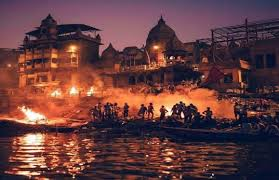Why ‘94’ Is Written on the Ashes at Kashi’s Manikarnika Ghat — The Hidden Sanatan Meaning
- Sonali Singh
- Oct 27
- 4 min read
Why is ‘94’ marked on ashes at Kashi’s Manikarnika Ghat? Delve into the Sanatangyan insight behind this sacred ritual — where 94 karmas burn away, leaving the rest to divine will.
Recently, the mysterious number ‘94’ written on the ashes at Kashi’s Manikarnika Ghat has gone viral on Quora and social media, sparking deep curiosity and spiritual debate. Beyond superstition, this number reflects a profound Sanatangyan truth about karma, moksha, and divine control — an insight preserved in the wisdom of sadhu, guru, and shashtra for millennia.

A City Where Death Breathes Life
Varanasi — or Kashi, as ancient scriptures lovingly call it — is not merely a city; it’s a spiritual vibration where life and death coexist on the sacred ghats of the Ganga. Of these, Manikarnika Ghat is the most sacred of all — a cremation ground where, according to the Rigveda:
“अग्निर्ज्योतिर्ज्योतिः सूर्यः।”
“Agni is light, and light is the Sun.”
The Manikarnika fire never perishes. It is reputed to have burned without end for many thousand years, representing the unbroken cycle of birth, death, and rebirth — the essence of Sanatangyan, or eternal knowledge.
Daily, hundreds of spirit souls take their last journey here, their mortal bodies committed to the flames in hopes of achieving moksha — release from the wheel of samsara. Yet among all the rituals followed at this sacred ghat, one small, cryptic act continues to fascinate: the writing of ‘94’ on the ashes before immersion in the Ganga.

The Mystery of the Number 94
Locals of Kashi say that the tradition of writing “94” is an ancient, unwritten custom, known only to those who live close to the ghats. Outsiders, even those performing the last rites, rarely notice it. Once the funeral fire cools and the ashes (raakh) are collected, the priest or the dom — the sacred cremation keeper — writes ‘94’ using the remaining ash.
According to Hindu shastras and oral teachings of Sanatangyan, human life consists of 100 karmas (deeds). Out of these, 94 karmas lie under human control, guiding our moral, social, and spiritual journey — our actions, choices, and dharma. The other six karmas — life, death, fame, shame, gain, and loss — belong to Brahma, the god creator alone.
Thus, the act of writing “94” on the ashes is deeply symbolic. It marks the burning away of all karmas within human control, while leaving the remaining six to the divine will. The body and mind dissolve, but destiny — shaped by these six — continues its cosmic cycle.

The Wisdom Behind the Ritual
A Quora user named Vipin Tripathimani beautifully explained:
“The Gita also states that after death, the mind takes with it five senses. This number is 6 — the mind and the five senses. No one except nature knows where one will be born next. So, the 94 karmas consumed by the fire are lost with the 6… and the subsequent 6 karmas form a new life.
This aligns with Bhagavad Gita (15.8):
“शरीरं यदवाप्नोति यच्चाप्युत्क्रामतीश्वरः ।
गृहित्वैतानि संयाति वायुर्गन्धानिवाशयात् ॥”
“As the air carries scents from their source, so does the embodied soul carry the mind and senses from one body to another.”
The “94” written on ashes thus represents spiritual completion — the burning of deeds that were once under one’s control, surrendering the rest to the divine. It’s as if the universe whispers: “You have done what you could. Now, leave the rest to Me.”

The Final Act: The Water Pot Ritual
After writing “94”, the priest or guru overseeing the rites performs a final act — breaking a water-filled earthen pot over the pyre. This ritual, called Kapal Kriya, symbolizes the severing of all earthly bonds. The moment the pot breaks and water flows, the soul is believed to move beyond material attachment toward liberation. Some sadhus believe that ‘94’ itself acts as a Mukti Mantra, a silent prayer for the soul’s release into higher realms.
Sanatangyan’s Eternal Message in ‘94’
In the light of Sanatangyan, the number 94 is not a mystery but a message — a reminder of cosmic humility. It instills the idea that though man endeavors, meditates, and performs actions pursuant to shashtra and dharma, final control is always with God.
“कर्मण्येवाधिकारस्ते मा फलेषु कदाचन।”
“You have the right to perform your actions, but not to the fruits thereof.” — Bhagavad Gita 2.47
For the residents of Kashi, “94” is not merely a number on ashes — it’s a whisper of eternal truth, a final farewell from this world written in the language of karma and surrender.

In effect, the digit '94' in Manikarnika Ghat is more than a smudge on ashes — it is a reflection of Sanatangyan's timeless wisdom — where human endeavor ceases and divine will takes over. It is a reminder to every soul that 94 karmas are being consumed by the holy fire, leaving the other six with Brahma, reminding one of the ageless motto of surrender, freedom, and trust in the cosmic universe.

Comments